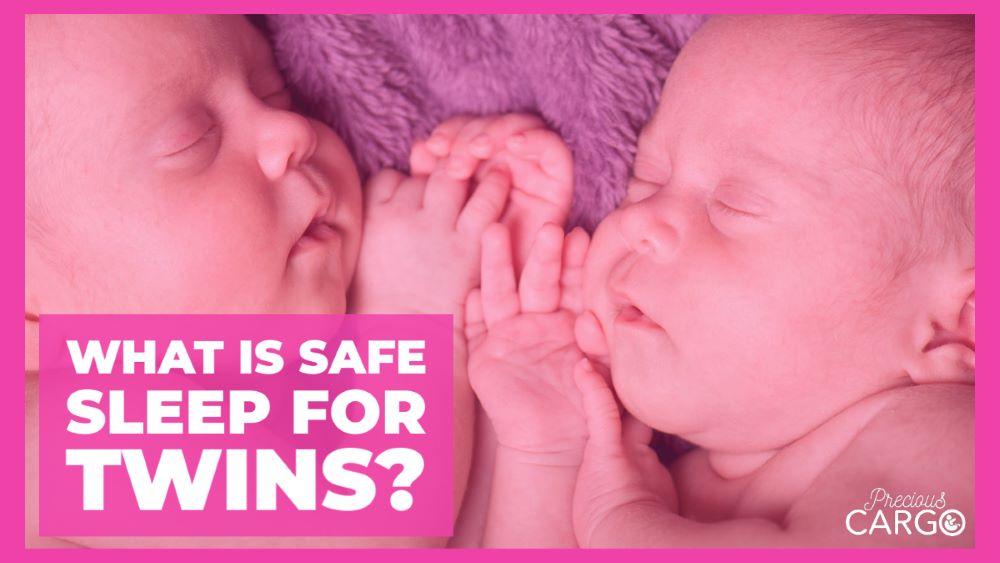
Having twins is twice the fun but at times it can be twice as challenging especially when it comes to sleep. Parents of twins will often try anything to encourage their babies to sleep including allowing them to sleep together on the same surface. While it may help settle them, what are the safe sleep recommendations when it comes to twins?
Safe sleep for twins or multiples follow the same guidelines which are set out for single babies. This means that they should be placed alone on their back on a firm and flat mattress in a bare cot and ideally share the same room as you for at least the first six months.
Although the basics appear to be the same, there are a few extra things to think about with twins and safe sleep.
IS THE RISK OF SIDS HIGHER FOR TWINS?
The likelihood of delivering a twin pregnancy before 37 is about 50-60%. This means that approximately 50-60% of twins are born prematurely. It has been proven that the SIDS death rate is higher in infants who were born prematurely when compared to those born after 37 weeks.
While a preterm infant shares the same potential SIDS risk factors, there is the additional risk of the prematurity itself and the likelihood of an associated low birth weight. Research has shown that the risk of SIDS increases as the gestation or length of the pregnancy shortens.

IS IT SAFE FOR MY TWINS TO SHARE A COT?
Letting your twins share a sleep surface such as sleeping in the same cot is better known as co-bedding. This is a well-known practice which frequently occurs in the Neonatal ICU and is proven to promote better sleep and increased weight gain of preterm twins in addition to having fewer episodes of their heartbeat slowing down or periods when they do not breathe.
The theory behind this practice is that allowing them to be together mimics the womb-like setting where they are used to being with each other. Twins are only reunited with each other in the Neonatal ICU once they are stable and free of any infection and if they are approximately the same size.
While there is no definitive information or evidence supporting or opposing your twins sharing a cot when they come home, there are suggestions that it is safe to do if your new-born twins are similar in size. The research that is available suggests that twins who share a cot develop similar sleeping patterns which can make a huge difference to parents of twins.
It is however crucial that once your twins begin to roll they are moved to separate sleeping surfaces to prevent them from rolling onto each other and possibly blocking theirs or their siblings mouth and nose.
Co-bedding in which your twins share the same sleep surface should not be confused with co-sleeping which is when your twins would share the same sleep surface as an adult or parent. It is strongly advised that this be avoided at all costs especially if the adult is under the influence of any medication, alcohol or smokes as this can increase the possible risk of SIDS or suffocation.

WHAT ARE THE BENEFITS OF MY TWINS SLEEPING TOGETHER?
While the benefits of your twins sleeping together in the Neonatal ICU are clear and evident, no studies have explored the advantages of them co-bedding at home. However it is expected that the same benefits would continue at home especially for the first few weeks.
There are indications that allowing your twins to co-bed helps them regulate their body temperature, soothe each other and sync sleep cycles. Some parents may be concerned that co-bedding could result in them waking each other up, however, this does not appear to be the case.
As a twin and having shared your womb together, they have a strong awareness of each other and find comfort and reassurance in this. Allowing your twins to co-bed especially when they are young, can help them adjust from your womb to the outside world while feeling safe and having something familiar near them.
Sharing a room with your baby, especially for the first 6 months has proven to be an important measure in reducing the possible risk of SIDS. With twins, it may not be practical to have two cots in your room and so allowing them to co-bed in the same cot makes it easier to do in a restricted space.

WHAT ARE THE RISKS OF MY TWINS SLEEPING ON THE SAME SURFACE?
There is no scientific research which has been specifically conducted to determine the safety risks of twins co-bedding. As a result of this lack of evidence, well known organisations and professional bodies are unable to support or oppose twins sleeping together on the same surface. Instead they suggest the established safe sleep guideline of separate sleeping surfaces.
The concern that some professionals have with allowing twins to share a sleeping surface is that it may increase the potential risk of SIDS and suffocation. This worry stems from the fact that one twin may move and unintentionally block or restrict their siblings airway. The likelihood of this increases as your baby develops and begins to move and roll.
WHEN IS IT NOT SAFE FOR MY TWINS TO SLEEP TOGETHER?
There are certain times when it is not safe for your twins to sleep together. These include:
- Sharing a Moses basket or bassinet as they are too small to safely accommodate two babies and there is the additional risk of overheating.
- If there is a large discrepancy in size between the siblings.

WHAT SAFE SLEEP PRINCIPALS ARE RECOMMENDED FOR TWINS SLEEPING ON THE SAME SURFACE?
The same standard principles which are set out for single babies, should be applied to twins. This means that your babies should:
- Be placed on their back for every sleep time.
- Sleep on a flat and firm mattress with a waterproof covering.
- Have an empty with no blankets, pillows or soft toys etc.
- Share a room with you for the first 6 months
There are however additional guidelines to use when your twins share a sleeping surface which may help reduce the potential of SIDS or suffocation. These include:
- Do not use any type of cot dividers, rolled up towels or pillows between your twins as these can become potential hazards.
- As soon as either of the babies begin to roll, it is safer to move them to separate sleeping surfaces.
- Using a Moses basket or bassinet is not recommended as they are too small to safely accommodate both babies while they sleep.

WHAT IS THE BEST WAY TO ALLOW MY TWINS TO SLEEP TOGETHER?
The American Academy of Paediatrics (AAP) recommends that each baby has their own sleeping place, be it a crib or bassinet.
"The safety and benefits of cobedding for twins and higherorder multiples have not been established. It is prudent to provide separate sleep surfaces and avoid cobedding for twins and higherorder multiples in the hospital and at home" (Moon et al. November 2016).
However, The Lullaby Trust suggests that when placing your twins in the same cot, they are positioned in a “feet to foot” manner. This means that each baby’s feet are on opposite sides at the foot of the cot and the tops of their heads face one another.
Should you wish to place your twins side by side in a cot, it is strongly suggested that it only be done for the first few weeks before they can roll. Additionally, placing them side by side with their feet against the side of the cot while ensuring they are not close enough to touch each other, would be the safest way for them to sleep.
With each of these positions, it is vital that your baby sleeps on their back on a firm and flat mattress in an otherwise empty cot.
At the time of publishing, we could find no evidence to back up this suggestion made by The Lullaby Trust due to the lack of reserach on safe sleep for twins.
Navigating the world of twins is new, overwhelming and exciting. Being aware of safe sleep practices for multiples can ease some of that stress and worry.

references
https://www.lullabytrust.org.uk/safer-sleep-advice/twins/
https://www.ncbi.nlm.nih.gov/pmc/articles/PMC3496289/
https://twinstrust.org/let-us-help/parenting/under-1s/sleep.html
https://www.nhs.uk/conditions/baby/newborn-twins-and-multiples/twins-and-sleep/
https://rednose.org.au/article/co-bedding-twins
https://rednose.org.au/downloads/Co-Bedding-Safe_Sleeping-Information_Statement_Nov_2017_WEB.pdf
https://www.verywellfamily.com/should-twins-sleep-together-at-home-2748590
